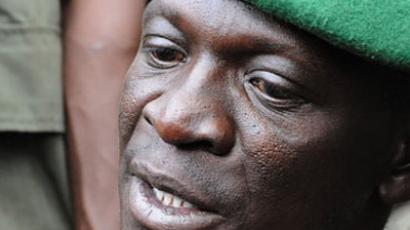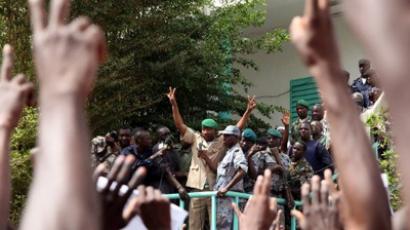Junta backpedals as Tuaregs declare independence from Mali
After three months of military advances, the Tuareg forces controlling north-eastern Mali declared its independence from the junta-controlled south-west. Such a turn has prompted the coup leaders to agree to hand over power to civilians.
The latest news comes from the official mediator of the 15-state West African ECOWAS group. The coup leader, Captain Amadou Haya Sanogo, signed an accord late Friday agreeing to pass the rule to civilians in return for the end of sanctions by Mali’s neighbors who had threatened to strangle the country’s economy following the coup.Sanogo stated that under the country’s constitution, the head of the National Assembly becomes interim president in the event of a vacancy of power. The head of the parliament will now form an interim government which will then organize new elections.The Tuareg declaration of independence was voiced on Friday by the National Movement for the Liberation of Azawad (NMLA), the political force behind the rebellion. Tuaregs have been seeking sovereignty over their historical homeland, Azawad in western Africa, for decades.The NMLA called on the international community to recognize their rights for self-determination. It also reiterated its pledge to stop hostilities against the central government of Mali, focusing instead on building up security in their territory.Several key players in the region have already rejected the call and refused to recognize Azawad as a sovereign state. These include France – of which Mali is a former colony and which maintains business interests there now – and Algeria, southern portions of which are populated by Tuaregs.The situation in the rebel-controlled territory remains tense, with reports of rampant looting and militant attacks coming from it. There are fears that if it is not taken under control, a fully-fledged humanitarian crisis may break out.On Thursday an Algerian consulate in the city of Gao was stormed by people, who are believed to be members of the extremist Islamist Tuareg group Ansar ad-Dine. The gunmen abducted seven diplomats.The NMLA called the act “deplorable”, but it is not clear whether it has enough leverage on Ansar ad-Dine. There are conflicting reports over which of the rival factions is more powerful at the moment.Mali governmental forces have been failing to stop the Tuareg advance ever since it began in January. Government troops retreated from the northern part of the country after a military coup two weeks ago. Mali’s prospect of becoming a failed state caused concern among its neighbors and investors.Members of the Economic Community of West African States, a regional economic block, threatened to impose sanctions against Mali if the junta does not return power to the ousted President Toure.It wanted to carry out an on-site inspection of Mali and hold talks with the interim government, but the delegation’s plane could not land due to a pro-junta crowd, which gathered at the airport.
Mali coup: Microcosm of African Spring?
The coup makers admit that they have gotten themselves in a mess, says Abdul Akbar Muhammad, international representative of the Nation of Islam religious and humanitarian movement.“The stated reason for the coup, when it unfolded, was that they did not get support from the government in power to fight Tuaregs in the north,” he explained. And while the military were busy overthrowing the government, the Tuaregs took over three main cities and declared an independent state in the north.“What they hoped to accomplish by overthrowing the government indeed was a measurable failure,” Muhammad said. “Now the country is beginning to break up into pieces.”Ethnic Tuaregs have fled Libya well-armed and battle-hardened after operating as pro-Gaddafi fighters. But besides Tuaregs, there are huge numbers of revolutionaries who fled to other neighboring countries. “These numbers are unbelievable,” Muhammad said. “What about those who fled into Chad and Niger? Those who went to Mauritania? Those who are in Algeria?”Muhammad believes the whole region became destabilized as a result of the fall of Muammar Gaddafi, who struggled to keep Africa together during his rule. And the situation in Mali that got caught in the media spotlight is just a “microcosm” of what is happening in other African countries in the region at the moment.His position was echoed by Milton Allimadi, publisher and editor-in-chief at Black Star News. He says, the coup became a minor problem when the country started falling apart – and that it's all the result of Gaddafi’s fall.“For people to try to pretend that this rebellion is not tied with the NATO war on Libya is completely preposterous, because we know that it’s because of the collapse of the Gaddafi regime after the NATO invasion that the rebels were able to well equip themselves with the most sophisticated weaponry and for the first time really defeat the army of Mali,” he told RT.Now, he continued, the question is the insurgents in other regions of that part of Africa, who are equally well equipped. “We might just be seeing the beginning of the aftermath of the collapse of the Libyan government,” Allimadi said.“The initial call was for ECOWAS – the regional body to push back the coup d’état in Mali and to restore the constitutional government,” – something that, according to the latest developments, is beginning to happen, “but now it seems that the coup itself has become a minor problem, and how to deal with the apparent secession of an entire region of the country has become the bigger problem,” the journalist concluded.














